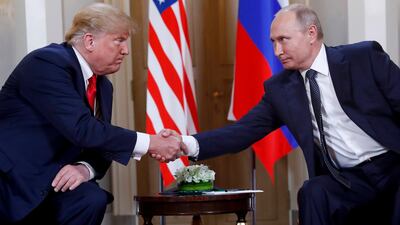A caravan of Central American migrants snakes through Mexico towards the US border. Washington musters 15,000 troops to repel any incursions. A combustible, unfolding situation is primed for explosion in the days after America’s bellwether midterm elections.
So far, the narrative of the situation has played into the midterms election campaign. But should the outcome of the vote deliver a setback for Donald Trump’s presidency, the administration could see its Latin American backyard as a platform to reimpose its authority.
“The president that loses a majority in Congress often finds that foreign policy becomes the only place to make his mark,” said Jeremy Shapiro, an expert on US politics at the European Council on Foreign Relations.
The America First agenda of the Trump administration has already upended the country’s established policies across broad swathes of international affairs, including trade ties with China, Middle East policy, the isolation of Iran and non-proliferation treaties with Russia.
Looking south from the US border, Trump officials see only chaos. In addition to the warnings of an illegal influx from its neighbours, the White House last week branded three South American countries, including Venezuela, as a "Troika of Tyranny".
One of the lessons of history, according to Mr Shapiro, is that limited military interventions can pay rich dividends for a beleaguered president. “If the president is faced with a Congress that is willing to investigate him continually, then the classic option is a smaller-scale military operation that garners a lot of press attention but does not involve a lot of risk,” he said. “The invasion of Grenada was instrumental, for example, in reshaping President Ronald Reagan’s image as a decisive leader.”
The loss of a majority in the House of Representatives has been the fate of most recent presidents during the midterm elections. While the switch in control has mainly domestic consequences, the implications for the president and the administration often plays out in foreign policy.
The president’s global agenda is an executive responsibility. Moreover the advice and consent functions of the constitution are reserved for the US Senate. Few pundits are predicting President Trump’s Republicans will lose both houses.
_______________
Read more:
Tomorrow's midterms could be a repeat of Clinton's catastrophic errors in the 1990s
A town where Trump is the only politician people talk about
Former Democrats in Pennsylvania are sticking with Trump
_______________
With Robert Mueller, the special investigator, reportedly poised to reveal details of his investigation into collusion between Russia and the Trump campaign within days of the vote, the combined fallout for the country’s relationship with the Kremlin will be closely watched.
Dana Allin, senior fellow for US foreign policy at the International Institute of Strategic Studies, points out that control of the House would grant subpoena power to Democratic chairmen of its committees. This would empower one, if not a series, of hostile investigations into Russia allegations surrounding Mr Trump and his associates.
While President Trump met President Vladimir Putin in Helsinki in June for an unprecedented one-on-one summit, their countries have done little to overcome long-term differences since the property magnate took power. The pressures unleashed by a raft of new Congressional investigations could alter a Russian policy that has been relatively restrained.
“So far relations with Russia have followed the establishment consensus, which has prevailed over the president’s instincts,” said Mr Allin. “As foreign policy becomes politicised that could change very quickly.”
Conversely, Mr Trump may have fewer moderating restraints as he sets policy against China. As global markets see-saw over Mr Trump’s push to secure trade concessions from Beijing, Mr Allin sees a Democrat-controlled House of Representatives as adding new complications to efforts to resolve the stand-off. “In the case of China, the Democrats are not averse to being tougher than even Mr Trump. The House in Democratic hands is not necessarily going to act as a constraint on China policy.”
The Trump White House took pains to cast its Middle East policy as a dramatic departure from that pursued by President Barack Obama. When President George W Bush and the Republicans suffered a setback in the 2006 mid-terms, the result paved the way for doubling down by the White House on its Iraq strategy. The "surge" of US forces in Iraq over the following two years stopped the country’s descent into civil war.
Similarly President Trump’s push to isolate Iran can be maintained and intensified, since the Democrats lack the firepower to dictate a return to the Obama policies. “A Democratic House can’t really change the administration’s stance against Iran,” said Mr Allin. “Any significant shift would only be possible with the return of a Democratic president in 2020 who was willing to re-assemble the Obama policies toward Iran.”
Mr Shapiro points out that the incoming Congress will be as vulnerable to Mr Trump’s unpredictability as the rest of the world. All sides will remain reactive to a US leader who has called his own playbook.
Following the elections, he expects the US president to shift the focus back to his attempts to coax the North Korean leader Kim Jong-un into a grand bargain. “What is quite remarkable about President Trump is his inconsistency. Just a year ago North Korea was a threat to America’s very existence and then suddenly he is pursuing an extraordinary dialogue with Kim Jong-un virtually overnight,” Mr Shapiro said. And more rabbits could be pulled from the hat should the result defy predictions of a Democratic “Blue Wave”.
“If the Republicans do better he could feel unleashed and that he was right all along despite what the nattering nabobs of negativity said,” Mr Shapiro said.
_______________
Read more:
Handing Trump more power would be a disastrous outcome for the midterms
Millions of US electors cast early ballots before midterms
Las Vegas holds the key to Democrats' Senate dream
_______________

